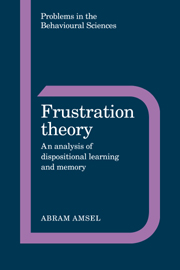Book contents
- Frontmatter
- Contents
- Preface
- List of abbreviations
- 1 Introduction: reward-schedule effects and dispositional learning
- 2 Motivational and associative mechanisms of behavior
- 3 Frustration theory: an overview of its experimental basis
- 4 Survival, durability, and transfer of persistence
- 5 Discrimination learning and prediscrimination effects
- 6 Alternatives and additions to frustration theory
- 7 Ontogeny of dispositional learning and the reward-schedule effects
- 8 Toward a developmental psychobiology of dispositional learning and memory
- 9 Summing up: steps in the psychobiological study of related behavioral effects
- 10 Applications to humans: a recapitulation and an addendum
- Appendix: some phenomena predicted or explained by frustration theory
- References
- Name index
- Subject index
Preface
Published online by Cambridge University Press: 20 March 2010
- Frontmatter
- Contents
- Preface
- List of abbreviations
- 1 Introduction: reward-schedule effects and dispositional learning
- 2 Motivational and associative mechanisms of behavior
- 3 Frustration theory: an overview of its experimental basis
- 4 Survival, durability, and transfer of persistence
- 5 Discrimination learning and prediscrimination effects
- 6 Alternatives and additions to frustration theory
- 7 Ontogeny of dispositional learning and the reward-schedule effects
- 8 Toward a developmental psychobiology of dispositional learning and memory
- 9 Summing up: steps in the psychobiological study of related behavioral effects
- 10 Applications to humans: a recapitulation and an addendum
- Appendix: some phenomena predicted or explained by frustration theory
- References
- Name index
- Subject index
Summary
There are two kinds of biologically oriented scientists who study behavior – nowadays we call them behavioral neuroscientists. One of these is interested in animals in the way a naturalist is, and often the question is, What can the animal do and how well can the animal do it? Or how intelligent is the animal, in terms of the way we understand cognitive abilities in humans? The other kind of investigator of behavior, or of brain–behavior relationships, uses one of a few animal species, in biological psychology predominantly the rat, pigeon, rabbit, or monkey, as an animal model for general – and specifically human – function and is not much interested in the animal in the naturalist's or cognitivist's way, except insofar as this kind of interest or knowledge affects his or her research and its interpretation. It will become obvious that the orientation of this book is of the latter kind: The experimental animal of choice is overwhelmingly Rattus norvegicus, and its study is designed to further the comprehension of what I have called dispositional learning and memory – systems that ordinarily have a long-term historical etiology and in which learning is relatively reflexive and memory implicit and not strongly episodic.
This is a book on frustration theory and not a book on frustration theories; I try to underscore this in Chapter 3, where I provide a brief review of theories of frustration.
Information
- Type
- Chapter
- Information
- Frustration TheoryAn Analysis of Dispositional Learning and Memory, pp. vii - xPublisher: Cambridge University PressPrint publication year: 1992
